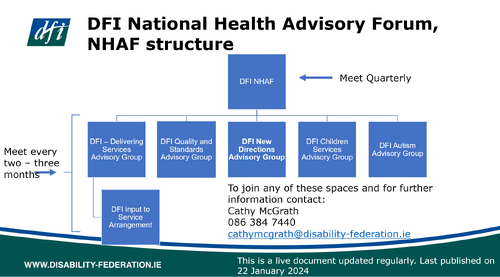Health
DFI's Health Advocacy Programme
Health is one of the foundation spaces for our advocacy in DFI. Disabled people can require specialist disability services, and similarly to all citizens require mainstream health services, as well as specialist mainstream services for diagnostics and post-diagnostic supports and an array of social supports in the community.
The focus of our work
As a federation of pan-disability voluntary organisations we work to support our members, and for their value to be recognised with appropriate resourcing for services to enable the realisation of the UN Convention on the Rights of Persons with Disabilities and for people with disabilities to have a life equal to all others.
How we do our work
In recent times, the DFI health advocacy space has experienced significant growth. As well as health policy analysis, we also deliver advocacy across key areas of health policy, service provision and organisation capacity, working as part of DFI’s wider advocacy programme. We operate through the structures of the Oireachtas and advocate to elected representatives, Government Departments, their policy makers and officials, Health Service Executive (HSE) including through national committees, and wider stakeholders of policy and service delivery.
Part of this work involves representation at national committee level, where many key decisions on health and social care services and programmes are developed and implemented. We cannot undertake this work without the active participation of our membership. To facilitate this, we operate a series of advisory groups and a system of member organisation representation on external committees.
DFI Health Advisory Groups
The diagram below outlines the scope of this advisory work with six advisory forums, who support the 25+ member organisation representatives.

Get in touch
For further details on our health advocacy programme, contact Catherine McGrath, Health Advocacy Manager.
You might also be interested in accessing information on a number of our ongoing and recent health related and research projects, including:
- Personalised Budgets - UNIC, Towards User-Centred Funding Models of Long-Term Care. Click here
- Neurological Community Services – The Neuro-Mapping Project: Working together towards integrated care in the community, for people with neuro rehabilitative needs. Click here
ENDS
